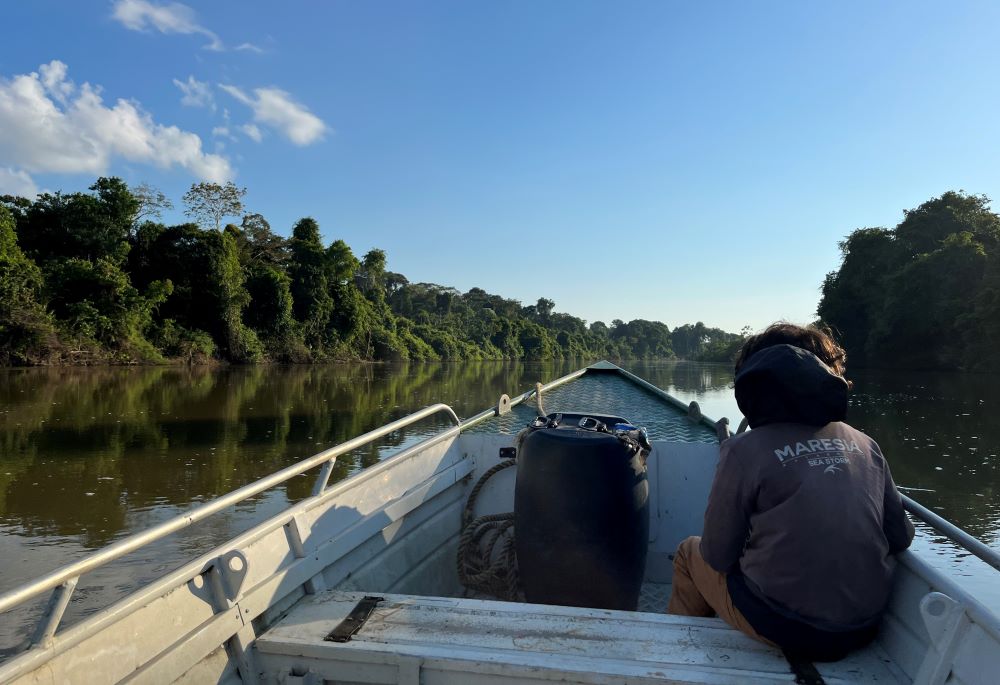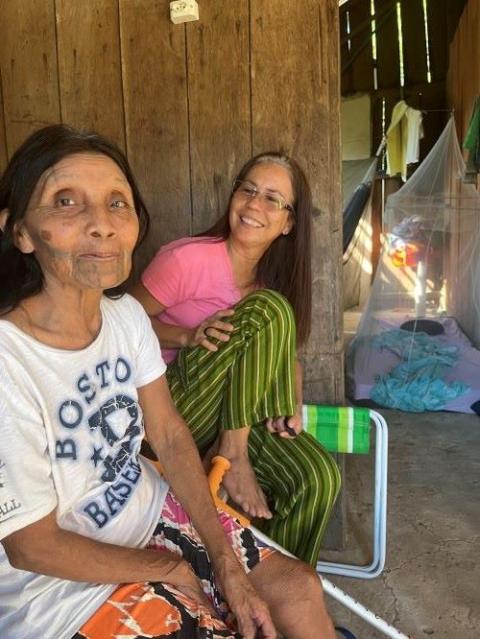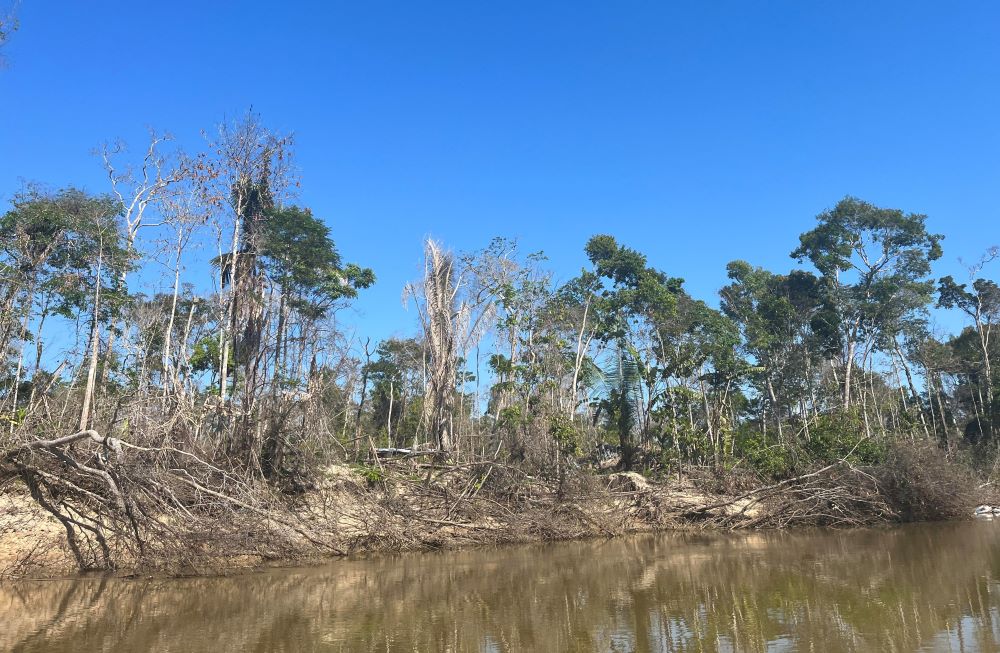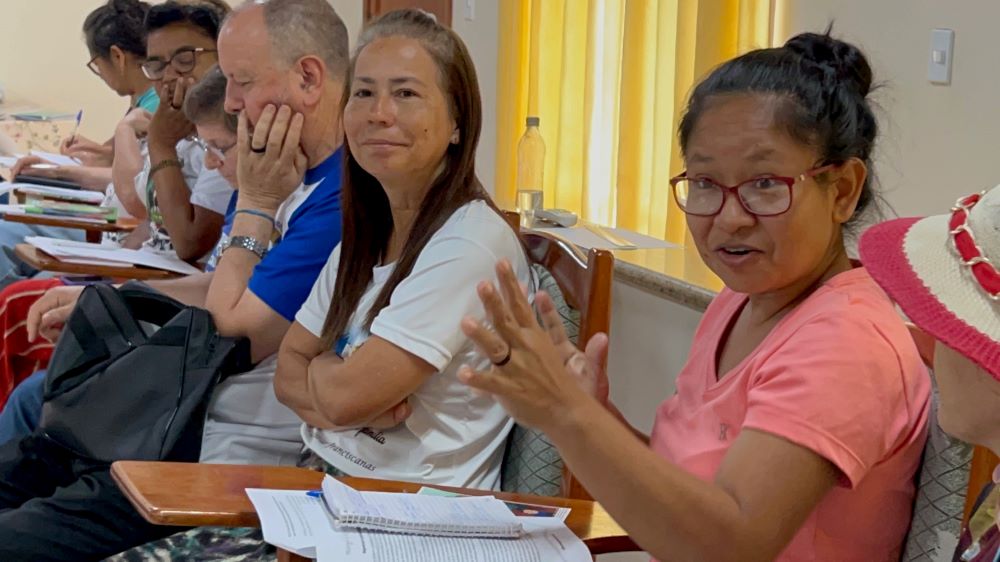
The Jaci Paraná River winds through Karipuna territory in the Amazon region of Brazil. There Sr. Laura Vicuña Pereira Mansohe accompanies indigenous peoples who serve as the vulnerable protectors of God's handiwork in the world's largest rainforest. (Ellie Hidalgo)
As Sr. Laura Vicuña Pereira Manso accompanies a group deep into the Amazon to protected territory belonging to the Karipuna people, thousands of butterflies dart in all directions like beautifully wrapped bits of God's delight. In a new way, I understood Pope Francis' encouragement to approach nature "with an openness to awe and wonder."
During these hot summer days, the nearby Jaci Paraná River was a welcome respite for Karipuna children. The Karipuna do not cut down their trees for profit and do not participate in the sale of carbon credits, which would mean relinquishing control of her people's right to make decisions about their land. They do harvest chestnuts and yucca to make grain they can sell.
Pereira Manso, a petite woman who is most comfortable when sitting barefoot on the floor, listens to Karipuna leaders for long stretches of time and has learned that "when someone is listened to, they can begin to solve their own problems." A member of the Congregation of Franciscan Catechists, she has been the presence of the Catholic Church in this remote territory where there are no priests.

Sr. Laura Vicuña Pereira Manso (back) has accompanied matriarch Katiká and the Karipuna people for more than seven years in defense of their human rights and their care of the Amazon rainforest in Karipuna territory, Brazil. She has been the presence of the Catholic Church in this remote territory where there are no priests. (Ellie Hidalgo)
Earlier this summer, I traveled to the Amazon region of Porto Velho, Brazil, with my colleague Casey Stanton. As co-directors of Discerning Deacons — a project to engage Catholics in the active discernment of our church about women and the diaconate — we wanted to see firsthand how Catholic women like Pereira Manso are vital to the work of accompanying indigenous peoples who serve as the vulnerable protectors of God's handiwork in the world's largest rainforest.
In June, Pereira Manso and two other indigenous women met with Pope Francis in Rome to discuss the vital contributions women make to a synodal church. Pereira Manso was recently appointed as vice president of the Ecclesial Conference of the Amazon, or CEAMA, which was created in 2020 following the Synod for the Amazon, for which Pereira Manso served as an auditor. CEAMA is the first of its kind to include women in a leadership position.
The Franciscan Catechists have a vocation to be the presence of the Catholic Church in remote lands where there are no priests. Indeed, the Archdiocese of Porto Velho spans 33,000 square miles and has 32 priests (By comparison, the U.S. state of Indiana is nearly 36,000 square miles and has 735 priests as of 2021). The diaconal charisms of Word, liturgy and service that God bestows on women is very much needed at the margins.
For some 23 years, Pereira Manso has supported indigenous peoples through the Brazilian bishops' Indigenous Missionary Council, or CIMI, in an effort "to hear both the cry of the earth and the cry of the poor," she says. She herself is a descendent of the Kariri people on her father's side and is committed to the vision of indigenous peoples becoming protagonists of their futures.
After visiting Karipuna's land, we returned to Porto Velho traveling by boat on a three-hour winding journey on the Jaci Paraná River. An hour into the trip, signs of destruction became achingly visible. Lush, dense trees turn into deforested lonely landscapes. To spend time in the Amazon is to become aware of resilience and fragility living side by side.
"We can’t renew the church if we don't also renew our common home," Pereira Manso tells us. "The best contribution we can make from the Amazon is to call the world to care for our common home."
Pereira Manso has accompanied Karipuna leaders as they learn to access the courts to denounce the actions of illegal land grabbers. Last year she accompanied them to Brasilia, where they met with 28 embassies to put pressure on the Brazilian government to recognize and to protect Karipuna territory.

This image outside Karipuna territory shows where deforestation has taken place in this part of the Amazon. (Ellie Hidalgo)
The struggle is gargantuan. Multinational corporate interests in logging, mining and cattle grazing dwarf the resources indigenous people have to mount a defense of the Amazon and to protect one of earth's most important biomes for clean air, a more stable climate and sufficient rainfall. Their attempts at resistance are often met with threats of violence and real persecution. In what could easily turn into lives of despair, Pereira Manso and a cadre of Catholic religious and lay women and men have committed themselves to accompanying indigenous communities as they seek to open up a horizon of hope.
Asked what fuels her fire for mission at the peripheries, Pereira Manso recalls a pivotal moment when she made her religious vows with the Congregation of Franciscan Catechists. Her mother was invited to share a few words and she told those gathered: "This daughter of mine is not just mine anymore. She belongs to the people."
This commitment to diaconal community service is often multigenerational. Pereira Manso's mother was a catechist and a key community leader who catalyzed numerous comunidades ecclesiales de base (small Christian communities) in Porto Velho. Franciscan Sr. Terezinha Dalcegio told us about her work to develop a formation center that prepared Catholics to lead and sustain a network of vibrant base communities in the absence of a priest.

Sr. Laura Vicuña Pereira Manso (center) listens to women ministry leaders at a synodal reflection session in Porto Velho, Brazil. (Ellie Hidalgo)
We conclude our week in the Amazon by jointly facilitating a synodal gathering with 30 women ministry leaders to reflect on the recently published working document for the global synod. The instrumentum laboris asks Catholics to reflect on how the church can better fulfill its mission through greater recognition of the baptismal dignity of women, including increased participation in governance and decision-making processes. Is it possible to imagine women's inclusion in the diaconate?
In small groups, the women share their thinking and insights, and Porto Velho Archbishop Roque Paloschi arrives to participate in the listening. The desire to care for creation is a daily challenge. Ongoing formation is needed for women and to prepare priests and deacons for more collaborative ministry. Study groups and conversation circles are proposed.
Pereira Manso plays the song "Manos de Mujeres" ("Women's Hands") by Marta Gomez. Women recognize the gift of each other's hands in mutual support as they tend to the pastoral needs in their community. By belonging to one another they too can belong to their people.
Advertisement
Through their witness, Catholics in the Amazon are helping Catholics engaged with the questions of the global synod to imagine what breathing new life into permanent diaconate could mean for the church in the third millennium — a prophetic diaconate that includes men and women for a synodal church that goes out to the peripheries.
Pereira Manso hopes that the global synod could help the church to discern and recognize women's diaconal vocation, so that new emerging roles and participatory structures to sustain the faith and to accompany the people in their struggles are not later rolled back.
As the U.S. continues to close or consolidate parishes, I hope that stories from the Amazon can spark our own imagination for how to sustain the faith on our continent and what global consensus building asks of us as we discern how to be better allies to faith communities in Latin America.




